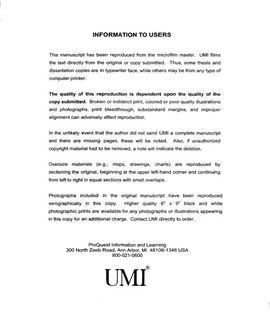| dc.contributor.advisor | Dharwadker, Aparna, | en_US |
| dc.contributor.author | Woode, Edward Winston Babatunde. | en_US |
| dc.date.accessioned | 2013-08-16T12:18:18Z | |
| dc.date.available | 2013-08-16T12:18:18Z | |
| dc.date.issued | 2001 | en_US |
| dc.identifier.uri | https://hdl.handle.net/11244/331 | |
| dc.description.abstract | Chapter 2 also finds similarities between Petals of Blood and Anthills of the Savannah. It explores the ramifications of Westernization, and the role of politics in the postcolonial nation/state. Characters' sociolects are dialogued and their subjectivities become undermined. | en_US |
| dc.description.abstract | Chapter 1 examines the oppositional relationship between Christianity and traditional religion, in the colonial landscape, and suggests that Christianity triumphs because of the fissures in tribal society. It establishes similarities between The River Between and Arrow of God. | en_US |
| dc.description.abstract | This dissertation examines postcoloniality in the contexts of "alterity" and "hybridity." In postcolonial theory, both terms are as problematic as "postcolonial." The primary texts discussed here treat alterity as the fusion of native 'self' and Western 'other, ' and hybridity as the disruption of native identity and simultaneous fusion with its Westernized counterpart, making both different and the same. In the non-fictive, Anglophone postcolonial landscape, processes of cultural and ideological embrace differ from a purely historical and geographical standpoint. In fiction, from an epistemological perspective, these processes are the same. For example, in works by Ngugi wa Thiongo, Chinua Achebe, Okot p'Bitek and Flora Nwapa, the Western/native encounter produces similar results, despite the different chronotopes (times and tribes) in which characters are located. Specifically, The River Between, Petals of Blood, Arrow, of God, Anthills of the Savannah, "Song of Lawino, " "Song of Ocol" and One is Enough are praxes of otherness and fusion. In these works, the major characters straddle two different cultures and embrace dissimilar ideologies, a practice that undermines their identities. | en_US |
| dc.description.abstract | Chapter 3 deals with alterity and hybridity in the context of gender, and theorizes that power relations, in domestic space, are similar in two different cultural environments (Acoli in "Song of Lawino" and "Song of Ocol"; Igbo in One is Enough). This chapter looks at female resistance to patriarchal ideology and women's prominent voices in the postcolonial landscape. | en_US |
| dc.description.abstract | The dissertation applies Homi Bhabha's ideas concerning hybridity, Mikhail Bakhtin's theories of novelistic discourse and Emmanuel Levina's philosophy of alterity and transcendence to the discussion of the primary texts, which are themselves intertextual. Together, they constitute a unified discourse that not only recognizes differences in native structures, but also acknowledges the indelible inscription of Westernization on postcolonial subjectivity. It is a discourse in which hybridity dismantles otherness and rejects hegemony, and alterity is defined in terms of geography, tribe, class and gender. | en_US |
| dc.format.extent | vii, 160 leaves ; | en_US |
| dc.subject | Literature, African. | en_US |
| dc.subject | Decolonization in literature. | en_US |
| dc.subject | Colonies in literature. | en_US |
| dc.subject | Literature and society English-speaking countries History. | en_US |
| dc.subject | African literature (English) History and criticism. | en_US |
| dc.title | Alterity and hybridity in Anglophone postcolonial literature: Ngugi, Achebe, p'Bitek and Nwapa. | en_US |
| dc.type | Thesis | en_US |
| dc.thesis.degree | Ph.D. | en_US |
| dc.thesis.degreeDiscipline | Department of English | en_US |
| dc.note | Source: Dissertation Abstracts International, Volume: 62-04, Section: A, page: 1408. | en_US |
| dc.note | Adviser: Aparna Dharwadker. | en_US |
| ou.identifier | (UMI)AAI3013155 | en_US |
| ou.group | College of Arts and Sciences::Department of English | |
